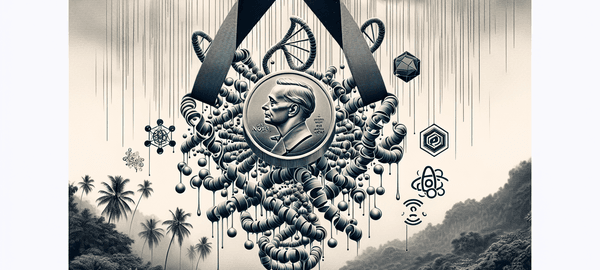Artificial intelligence shatters scientific barriers, earning its creators the prestigious Nobel Prize.
In a groundbreaking moment for artificial intelligence, the Nobel Prize in Chemistry has been awarded to pioneers in protein structure prediction. This revolutionary development, reminiscent of Liquid AI’s non-transformer models, marks a pivotal leap in our understanding of life’s building blocks.
As a musician and tech enthusiast, I’m reminded of how AI has transformed music composition. Just as AI can now predict protein structures in hours, it’s helping composers like me generate complex harmonies in minutes. The parallels between scientific and artistic innovation are truly mind-boggling!
DeepMind’s AlphaFold: Revolutionizing Protein Science
DeepMind’s CEO Demis Hassabis and I have received the Fellowship of the Royal Academy of Engineering on the same day, and spend the dinner ceremony chatting about all things AI and the future of the world. That was in 2016.
Today, he and Director John Jumper have been awarded half of the 2024 Nobel Prize in Chemistry for their groundbreaking work on AlphaFold. This artificial intelligence model has revolutionized protein structure prediction, solving a 50-year-old scientific challenge.
AlphaFold can predict the 3D structure of proteins using only their genetic sequence, accelerating a process that once took years to mere hours. This breakthrough covers most of the 200 million known proteins, opening vast possibilities in drug discovery, disease diagnosis, and bioengineering.
The other half of the prize went to David Baker for his work on computational protein design. Together, these achievements mark a new era in chemistry and artificial intelligence, showcasing the power of AI in solving complex scientific problems.
AI-Powered Protein Design: A Revolutionary Business Idea
Imagine a startup that harnesses the power of artificial intelligence to design custom proteins for various industries. This company would use advanced AI algorithms, inspired by Nobel Prize-winning research, to create tailor-made proteins for pharmaceuticals, agriculture, and sustainable materials. The business model would involve licensing the AI platform to biotech firms and research institutions, while also developing its own portfolio of patented protein designs. Revenue streams could include subscription fees, royalties from successful applications, and direct sales of engineered proteins for specific industrial uses.
Embrace the AI-Powered Future
The Nobel Prize recognition of AI in protein science is just the beginning. As we stand on the brink of a new scientific era, the possibilities are boundless. How will you harness the power of AI in your field? Whether you’re a researcher, entrepreneur, or curious mind, now is the time to explore, innovate, and push boundaries. What groundbreaking AI application will you pioneer next?
FAQ: AI and the Nobel Prize
Q: What is AlphaFold?
A: AlphaFold is an AI model developed by DeepMind that predicts 3D protein structures from genetic sequences, revolutionizing a process that previously took years.
Q: How does AI impact drug discovery?
A: AI accelerates drug discovery by quickly predicting protein structures, which is crucial for understanding diseases and designing targeted therapies.
Q: Can AI create new proteins?
A: Yes, David Baker’s work on computational protein design demonstrates AI’s capability to engineer entirely new proteins for specific functions.
